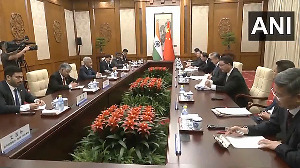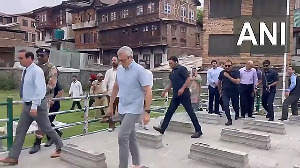Pakistan's Indus Waters commissioner Jamaat Ali Shah informed the media about the roadmap and said both sides had decided to hold two additional meetings one at the end of March and another in June for "dispute resolution". Both meetings will be in addition to the mandatory one scheduled for May, he said.
Briefing journalists at the conclusion of a five-day visit by a team led by his Indian counterpart G Ranganathan, Shah claimed the Indian side had agreed to Pakistan's demand that all water disputes should be settled within an "agreed timeframe". "Indian has agreed that the solution of all water disputes must be time-bound as open-ended talks become counter-productive and breed confusion and frustration," he said.
Pakistan also conveyed its concerns to India, including worries about "dwindling water supplies in western rivers", he said. Pakistan was given preferential rights to the western rivers under the Indus Waters Treaty of 1960. "The Indians have been told that reduction in supplies is affecting water transfer operation," Shah said. "We also pressed on the Indians that the free flow of information,
se_div_1">







